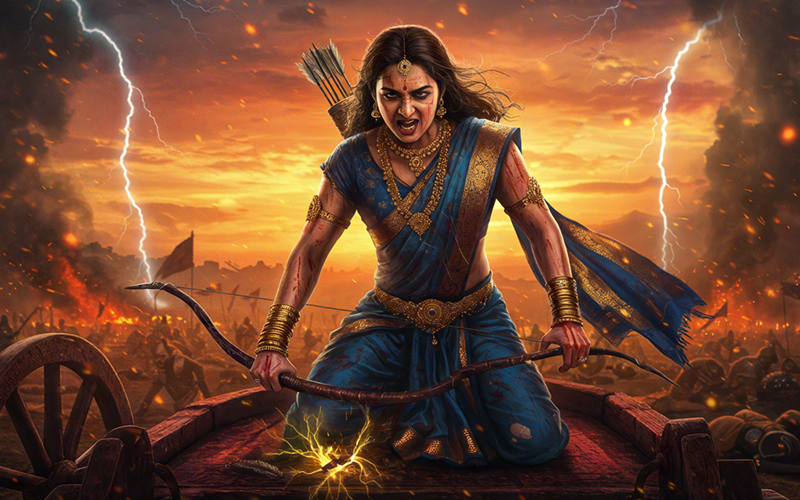Physical Address
Empirical System, 105 First Floor Pitru Krupa, Opp. R.K. Desai College, Koparli Road, Vapi (Gujarat) 396 191
Physical Address
Empirical System, 105 First Floor Pitru Krupa, Opp. R.K. Desai College, Koparli Road, Vapi (Gujarat) 396 191

The thirteenth year of the Pandavas’ exile was drawing to a close. In the court of Hastinapura, Duryodhana grew restless. His spies had searched every corner of the land, but the Pandavas remained hidden, a silent, looming threat. If they completed their exile in secret, they would return, stronger and more determined than ever, to reclaim their kingdom.
This is the story from the Virata Parva—a tale of disguise, revelation, and the thunderous return of a warrior who would remind the world of the power of Dharma.
News of the mysterious death of Keechak, the powerful and wicked commander of the Matsya kingdom, reached Hastinapura. Susharma, king of Trigarta, saw an opportunity. With Keechak gone, the Matsya kingdom, ruled by King Virata, was vulnerable. He proposed an attack to plunder its vast herds of cattle.
Duryodhana, eager to force the Pandavas out of hiding, agreed. Their plan was simple: Susharma would attack from one side, and the next day, the entire Kaurava army—led by Bhishma, Drona, Karna, and Duryodhana himself—would strike from the other. They were confident that this invasion would either reveal the Pandavas or cripple a potential ally. They had no idea they were walking into a divine trap.
As Susharma’s army raided the cattle, King Virata, unaware that his greatest warriors were the Pandavas in disguise, led his forces into battle. The fight was fierce, and Virata was captured.
It was Yudhishthira (disguised as the courtier Kank) who saw this. He commanded Bhima (the cook Ballava) to rescue the king. Bhima, with Nakula and Sahadeva (the stable hands), unleashed his fury. He single-handedly crushed Susharma’s army, freed King Virata, and brought the defeated king back in humiliation. The first threat was neutralized, but the greater storm was yet to come.
The next day, the Kaurava army attacked. With King Virata away, the kingdom’s only defender was his young, arrogant son, Prince Uttar. He boasted in the women’s quarters that he could defeat the Kauravas alone, if only he had a skilled charioteer.
Draupadi (disguised as the maid Sairandhri) saw her chance. She suggested that Brihannala, the palace dance teacher, was once the charioteer for the great Arjuna.
Uttar, puffed up with pride, commanded Brihannala to take the reins. But as their chariot approached the battlefield, the sight of the vast Kaurava army—an ocean of warriors—shattered his courage. He leaped from the chariot and fled in terror.
Brihannala (Arjuna in disguise) calmly chased him down, chiding him for his cowardice. He offered the terrified prince a deal: “If you are too scared to fight, then you be my charioteer. I will face them.”
The moment when Prince Uttar realizes his humble dance teacher is the legendary Arjuna is one of the most thrilling in the Mahabharata. To see the fear, the revelation, and the divine power that follows, we have brought this incredible story to life on our YouTube channel, Vibes of Divinity.
Witness the return of a hero and the fear in the eyes of his enemies!
[Click here to watch: Pandavas Exile Ends – Arjuna Strikes Back | Virata Parva]
Don’t forget to like, subscribe, and hit the notification bell to continue your journey into the heart of divine stories with us!
Arjuna led the trembling prince to a lone Shami tree, where the Pandavas had hidden their celestial weapons. As he revealed the divine bows—including his own mighty Gandiva—Uttar stared in awe.
“Where are the Pandavas?” he whispered.
Brihannala smiled. “I am Arjuna. Kank is Yudhishthira. Ballava is Bhima…” He revealed all their identities. The truth dawned on Uttar. He was in the presence of legends. Humbled and inspired, he took the reins, now a proud charioteer to the world’s greatest archer.
Arjuna strung his Gandiva, and its thunderous twang echoed across the battlefield. The Kaurava commanders—Drona, Bhishma, Karna—froze. They knew that sound. It was the sound of impending doom.
Duryodhana, however, remained arrogant. “The thirteenth year is not yet over!” he declared. “If this is Arjuna, he has broken the terms of exile! We fight!”
But Bhishma, the grandsire, with his knowledge of time, corrected him. “The thirteen years are complete. They have honored their vow. Prepare for a battle you are not ready for.”
What followed was a masterclass in warfare. Arjuna, with Prince Uttar as his charioteer, faced the entire Kaurava army alone.
Finally, Arjuna unleashed the Sammohana Astra, a divine weapon that caused the entire Kaurava army (except Bhishma) to fall into a deep, unconscious swoon. As they lay motionless, Arjuna instructed Uttar to collect the upper garments of the defeated warriors as proof of their victory—a humiliation far greater than death.
As a final, parting shot, he fired an arrow that neatly sliced the jeweled crown from Duryodhana’s head. He then blew his conch, the Devadatta, its victorious roar signaling the end of the battle, the end of the exile, and the beginning of the inevitable path to Kurukshetra.
Arjuna’s solitary victory was not just a military triumph; it was a divine announcement. The Pandavas were back. Their adherence to Dharma had not weakened them; it had made them invincible. The Kauravas had been given a glimpse of the storm that was coming, a storm that their adharma had summoned.
The exile was over. The time for justice had begun.
What does Arjuna’s single-handed victory teach you about the power of righteousness? Share your thoughts in the comments below!